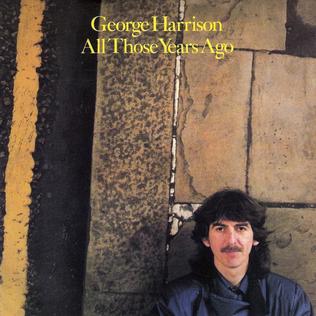 W
W"All Those Years Ago" is a song by English musician George Harrison, released in May 1981 as a single from his album Somewhere in England. Having previously recorded the music for the song, Harrison tailored the lyrics to serve as a personal tribute to his former Beatles bandmate John Lennon, following the latter's murder in 1980. Ringo Starr is featured on drums, and Paul McCartney overdubbed backing vocals onto the basic track. The single spent three weeks at number 2 on the US Billboard Hot 100, behind "Bette Davis Eyes" by Kim Carnes, and it peaked at number 13 on the UK Singles Chart. It also topped Canada's RPM singles chart and spent one week at number 1 on Billboard's Adult Contemporary listings.
 W
W"Any Road" is a song by George Harrison and is the opening track to his posthumous album Brainwashed. Harrison began writing the song in 1988, during the making of a video for his 1987 album Cloud Nine.
 W
W"Blow Away" is a song by English musician George Harrison that was released in February 1979 on his album George Harrison. It was also the lead single from the album. The song is one of Harrison's most popular recordings from his solo career and has appeared on the compilations Best of Dark Horse 1976–1989 and Let It Roll: Songs by George Harrison.
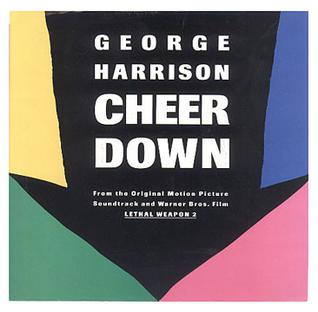 W
W"Cheer Down" is a song by English musician George Harrison that was first released in 1989. The track was his contribution to the soundtrack of the film Lethal Weapon 2 and was also issued as a single. Harrison wrote the song with Tom Petty and co-produced the recording with Jeff Lynne.
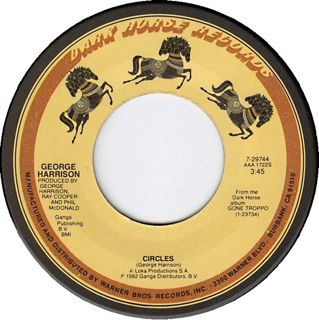 W
W"Circles" is a song by English rock musician George Harrison, released as the final track of his 1982 album Gone Troppo. Harrison wrote the song in India in 1968 while he and the Beatles were studying Transcendental Meditation with Maharishi Mahesh Yogi. The theme of the lyrics is reincarnation. The composition reflects the cyclical aspect of human existence as, according to Hindu doctrine, the soul continues to pass from one life to the next. Although the Beatles never formally recorded it, "Circles" was among the demos the group made at Harrison's Esher home, Kinfauns, in May 1968, while considering material for their double album The Beatles.
 W
W"Crackerbox Palace" is the ninth track on George Harrison's 1976 album, Thirty Three & 1/3. The song was released as the second single from the album and reached number 19 in the American pop charts.
 W
W"Faster" is a song by English rock musician George Harrison from his self-titled 1979 studio album. The song was inspired by Harrison's year away from music-making in 1977, during which he travelled with the Formula 1 World Championship, and by his friendship with racing drivers such as Jackie Stewart and Niki Lauda. Although equally applicable to other professions, the lyrics address the difficulties of achieving and maintaining success in the field of motorsport, particularly Formula 1.
 W
W"Got My Mind Set on You" is a song written and composed by Rudy Clark and originally recorded by James Ray in 1962, under the title "I've Got My Mind Set on You". An edited version of the song was released later in the year as a single on the Dynamic Sound label credited to James Ray with Hutch Davie Orchestra & Chorus.
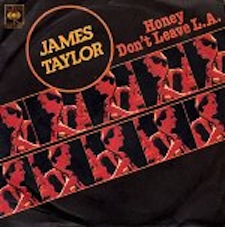 W
W"Honey Don't Leave L.A." is a song written by Danny Kortchmar. It was first recorded by Attitudes, a band consisting of Kortchmar, Paul Stallworth, Jim Keltner and David Foster, who met while backing George Harrison on his album Extra Texture . It was released on Attitudes' self-titled debut album in 1976. It was also released as a promotional single on Harrison's Dark Horse Records label.
 W
W"I Am Missing You" is a song by Indian musician Ravi Shankar, sung by his sister-in-law Lakshmi Shankar and released as the lead single from his 1974 album Shankar Family & Friends. The song is a rare Shankar composition in the Western pop genre, with English lyrics, and was written as a love song to the Hindu god Krishna. The recording was produced and arranged by George Harrison, in a style similar to Phil Spector's signature sound, and it was the first single issued on Harrison's Dark Horse record label. Other contributing musicians include Tom Scott, Nicky Hopkins, Billy Preston, Ringo Starr and Jim Keltner. A second version appears on Shankar Family & Friends, titled "I Am Missing You (Reprise)", featuring an arrangement closer to a folk ballad.
 W
W"I Really Love You" is a song written by Leroy Swearingen, and originally recorded by his Steubenville, Ohio, vocal group called The Stereos in 1961.
 W
W"It's What You Value" is a song by English musician George Harrison, released on his 1976 album Thirty Three & 1/3. As a single release in the United Kingdom, in May 1977, it was issued in a generic sleeve.
 W
W"Learning How to Love You" is a song by English musician George Harrison, released in 1976 as the closing track of his debut album on his Dark Horse record label, Thirty Three & 1/3. Harrison wrote the song for Herb Alpert, sometime singer and co-head of A&M Records, which at the time was the worldwide distributor for Dark Horse. Although the relationship with A&M soured due to Harrison's failure to deliver Thirty Three & 1/3 on schedule, resulting in litigation and a new distribution deal with Warner Bros. Records, Harrison still dedicated the song to Alpert in the album's liner notes.
 W
W"Love Comes to Everyone" is a song by English rock musician George Harrison from his 1979 album George Harrison. It is the opening track on the album and was also issued as the second single, after "Blow Away". The song reflects Harrison's contentment in his personal life as he was soon to become a father for the first time and married his second wife, Olivia Arias. Despite its commercial qualities, and contrary to some reviewers' predictions at the time of release, the song failed to become a hit.
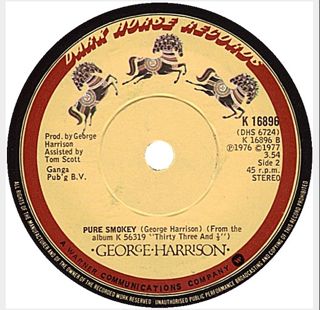 W
W"Pure Smokey" is a song by English musician George Harrison, released in 1976 on his debut album for Dark Horse Records, Thirty Three & 1/3. The song was the second of Harrison's musical tributes to American soul singer Smokey Robinson, following "Ooh Baby " in 1975. Harrison frequently cited Robinson as one of his favourite vocalists and songwriters, and Robinson's group the Miracles had similarly influenced the Beatles during the 1960s. In the lyrics to "Pure Smokey", Harrison gives thanks for the gift of Robinson's music, while making a statement regarding the importance of expressing appreciation and gratitude, rather than forgetting to do so and later regretting it. The song title came from the name of Robinson's 1974 album Pure Smokey.
 W
W"Teardrops" is a song by English rock musician George Harrison from his 1981 album Somewhere in England. It was also issued as the second single off the album, in July 1981. As with the lead single, "All Those Years Ago", Harrison completed the song after Warner Bros. Records had rejected his initial submission of Somewhere in England in September 1980. In response to Warner's concerns, he wrote "Teardrops" as an attempt at a commercially oriented song.
 W
W"This Is Love" is a song by English rock musician George Harrison that was released on his 1987 album Cloud Nine. Harrison co-wrote the song with Jeff Lynne, who also co-produced the track. In June 1988, it was issued as the third single from Cloud Nine, peaking at number 55 on the UK Singles Chart.
 W
W"This Song" is a song by English rock musician George Harrison from his 1976 album Thirty Three & 1/3. It was released as the first single from the album and reached number 25 on the American pop charts but failed to chart in the UK. Harrison wrote the song as a response to the copyright infringement suit launched against him over his early 1970s hit "My Sweet Lord". The lyrics use terminology associated with the court case and mention other song titles as a satirical comment on the notion of plagiarism in popular music.
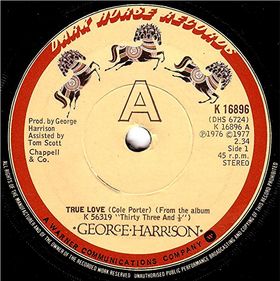 W
W"True Love" is a popular song written by American songwriter Cole Porter, published in 1956. The song was introduced by Bing Crosby and Grace Kelly in the musical film High Society. "True Love" was nominated for the Academy Award for Best Original Song. Kelly's contribution on the record is relatively minor, duetting with Crosby on only the final chorus. Nonetheless, the single is co-credited to her.
 W
W"Wake Up My Love" is a song by English rock musician George Harrison from his 1982 album Gone Troppo. Released as the A-side of the album's lead single, it peaked at number 53 in the United States but failed to chart in Britain. Harrison included the track on his 1989 compilation album Best of Dark Horse.
 W
W"When We Was Fab" is a song by English musician George Harrison, which he released on his 1987 album Cloud Nine. It was also issued as the second single from the album, in January 1988. The lyrics serve as a nostalgic reflection by Harrison on the days of Beatlemania during the 1960s, when the Beatles were first referred to as "the Fab Four". Harrison co-wrote the song with Jeff Lynne, who also co-produced the track. The recording references the psychedelic sound that the Beatles had helped popularise in 1967, through its use of sitar, cello, and backwards-relayed effects. Harrison's former Beatles bandmate Ringo Starr is among the other musicians on the track. The single was accompanied by an innovative music video, directed by the partnership of Kevin Godley and Lol Creme. One of Harrison's most popular songs, "When We Was Fab" has appeared on the compilations Best of Dark Horse 1976–1989 (1989) and Let It Roll (2009).
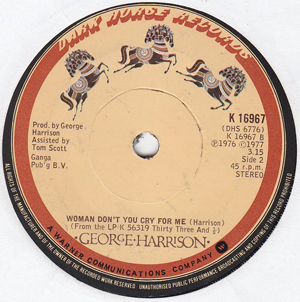 W
W"Woman Don't You Cry For Me" is a song by English musician George Harrison, released as the opening track of his 1976 album Thirty Three & 1/3.